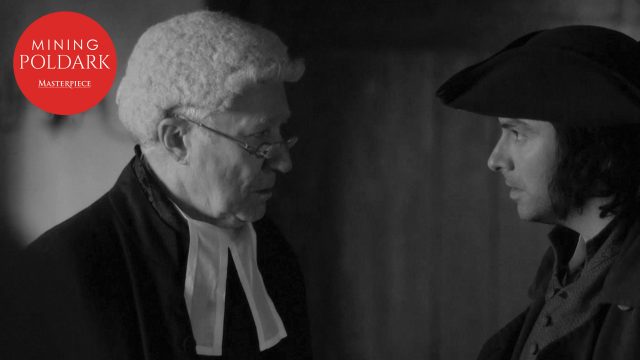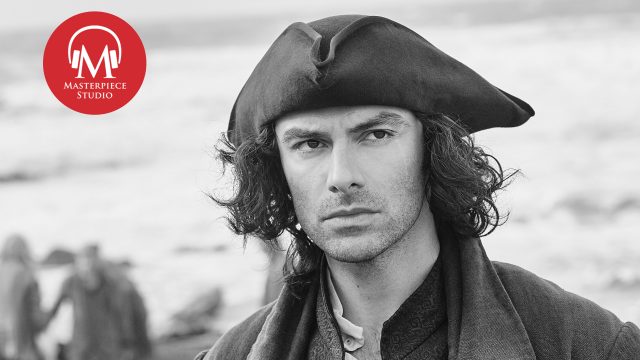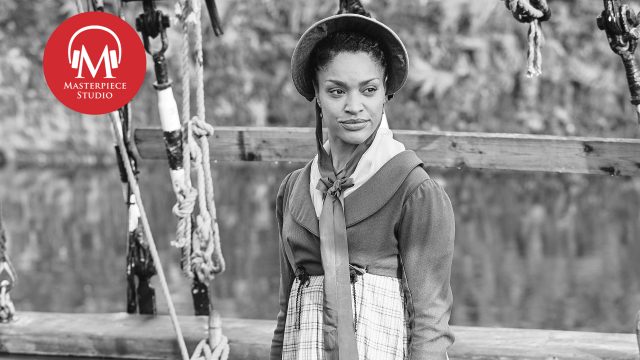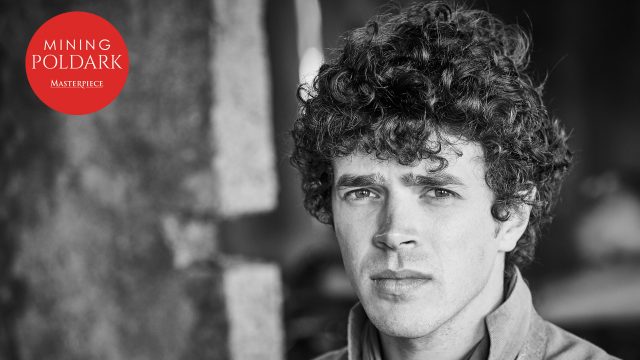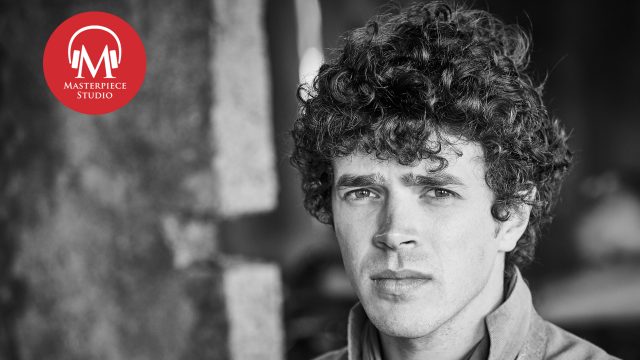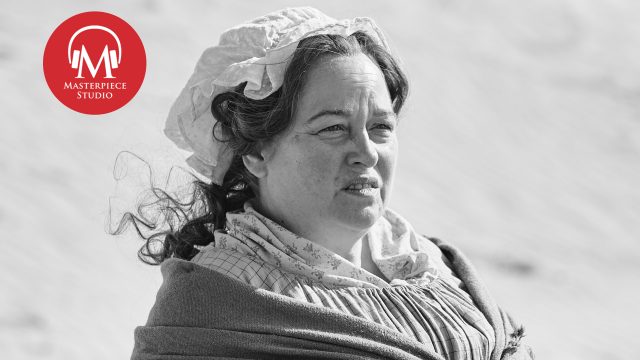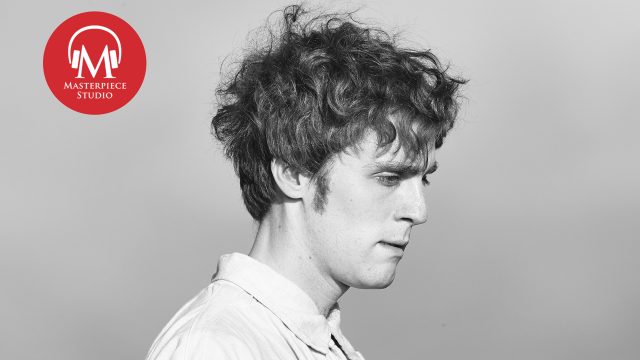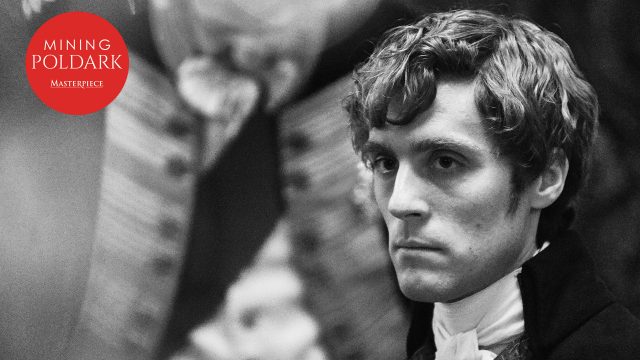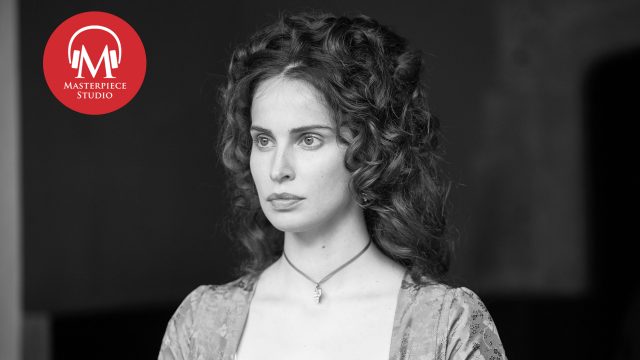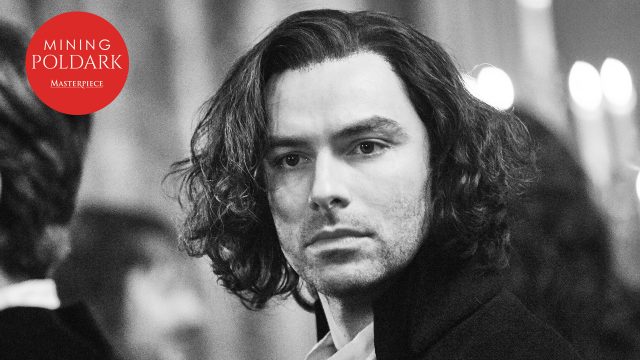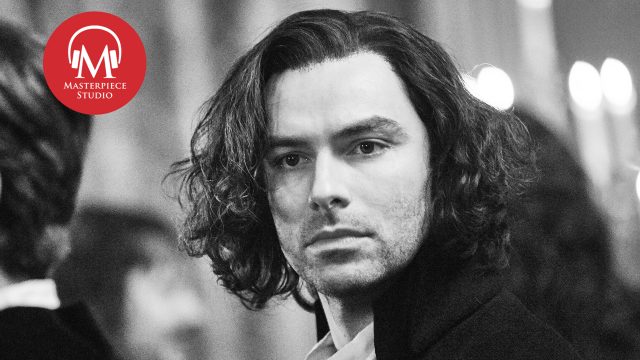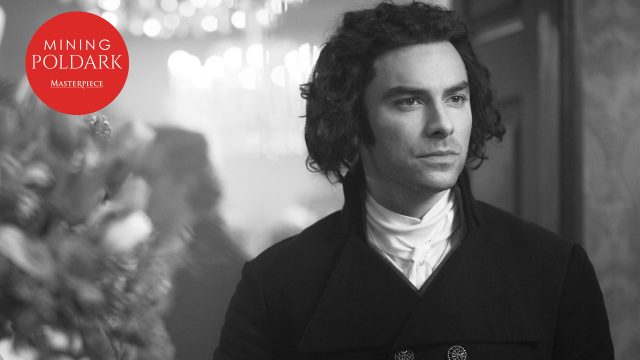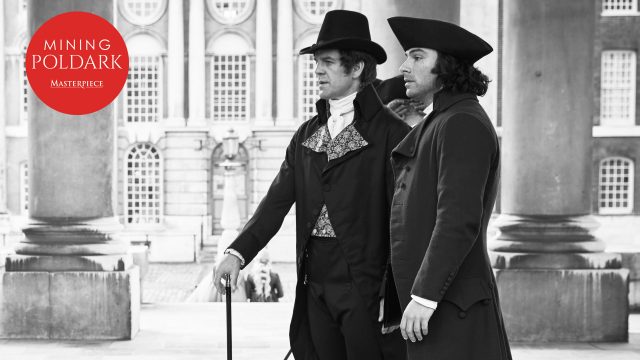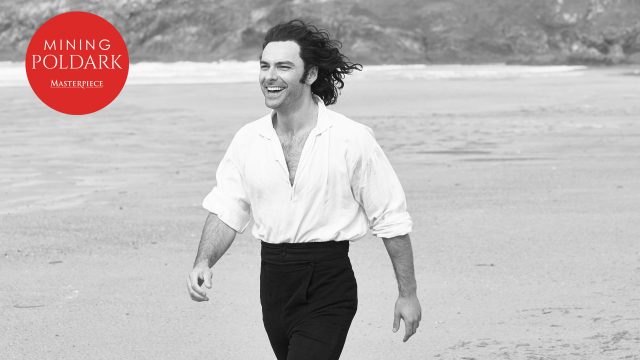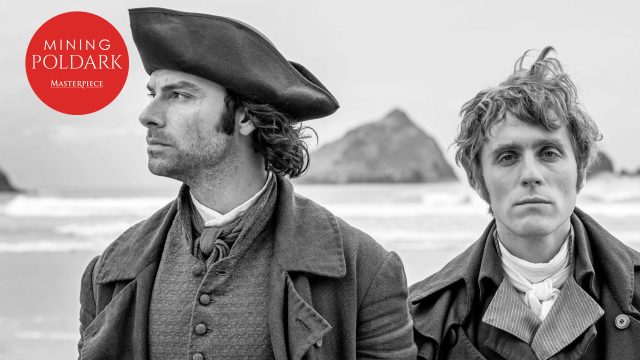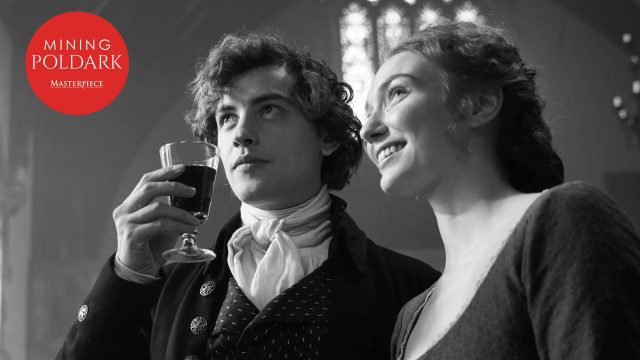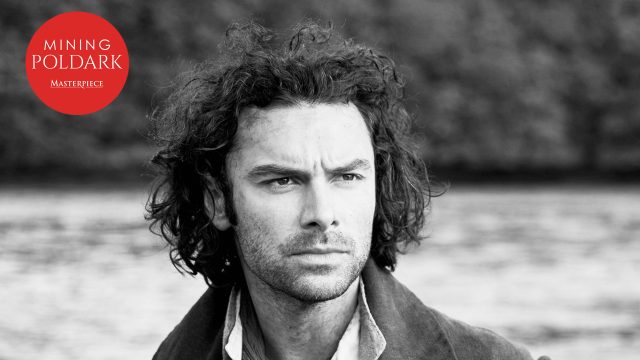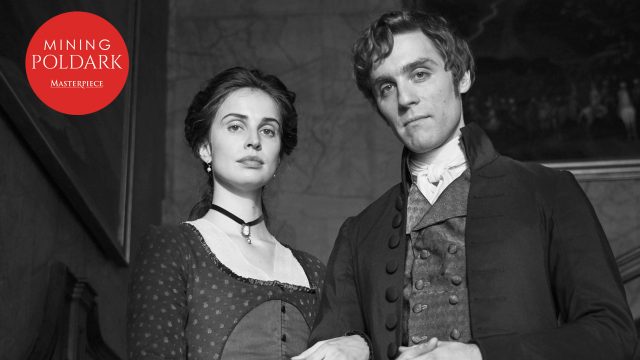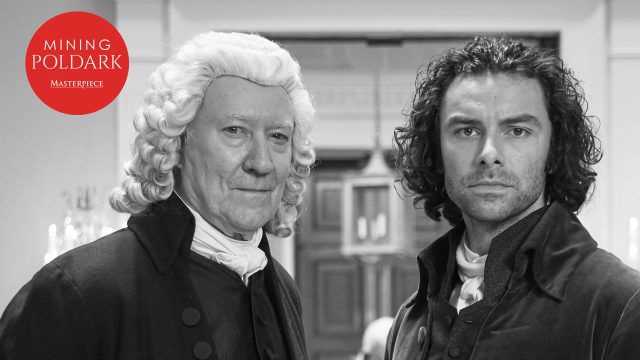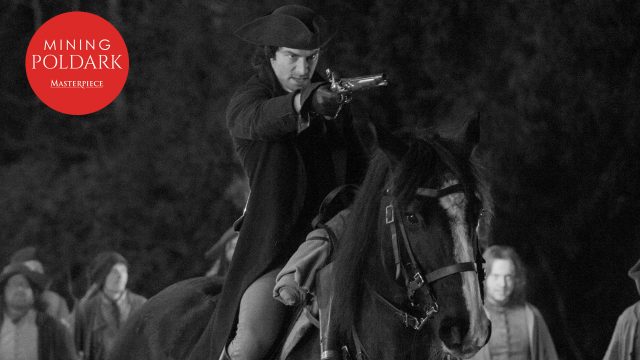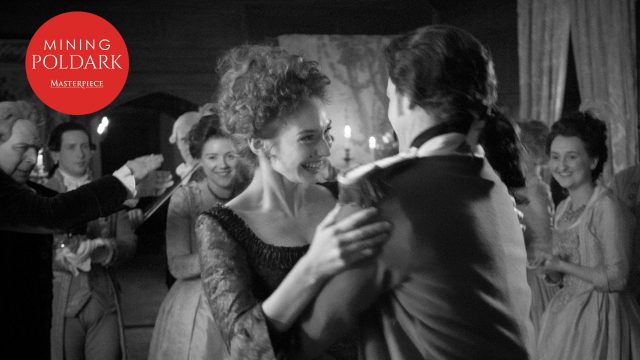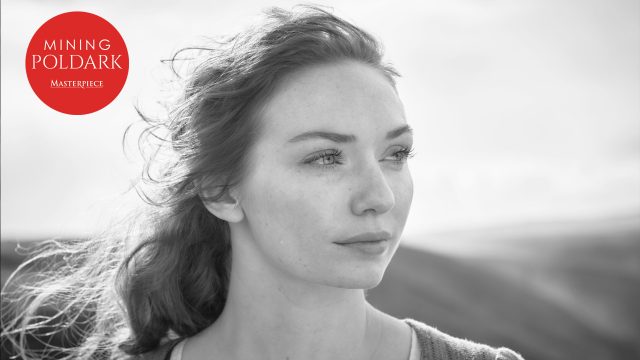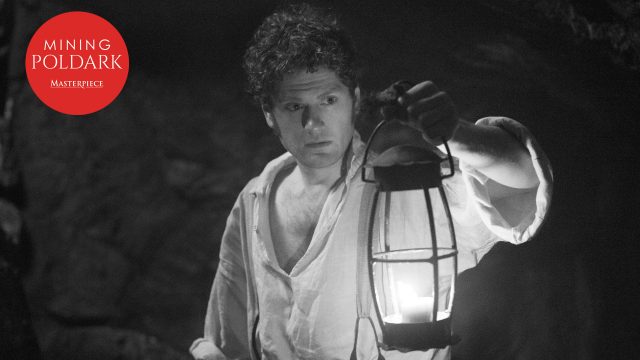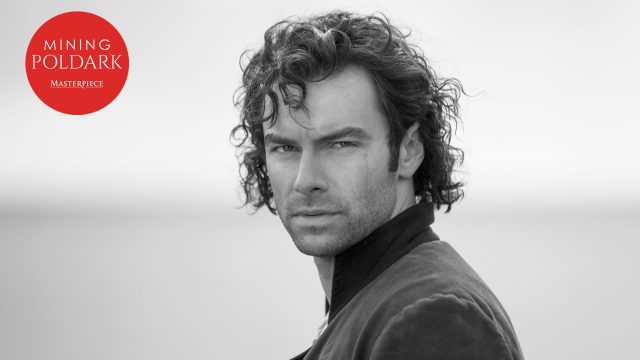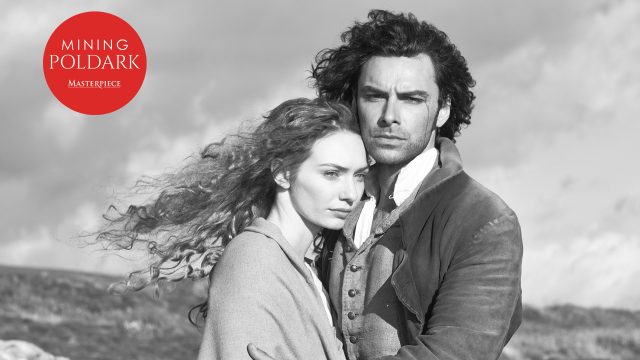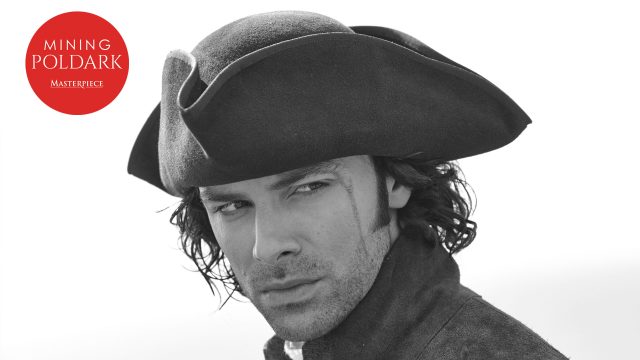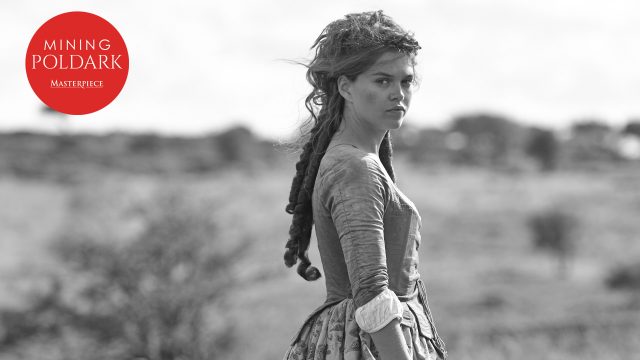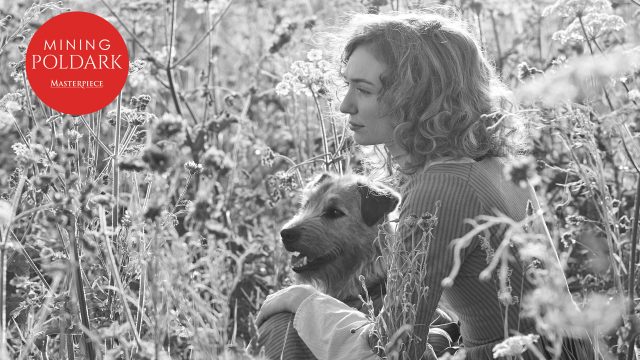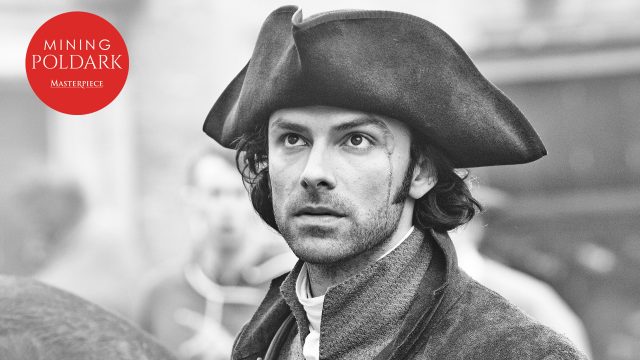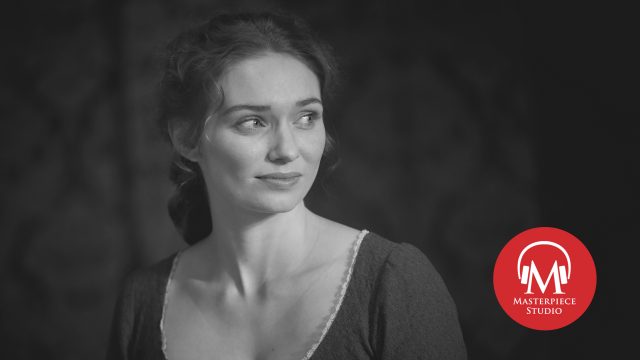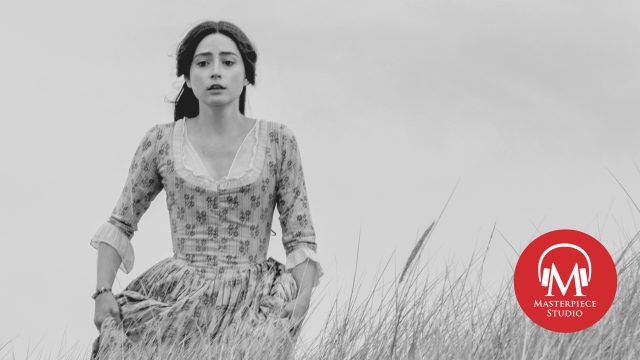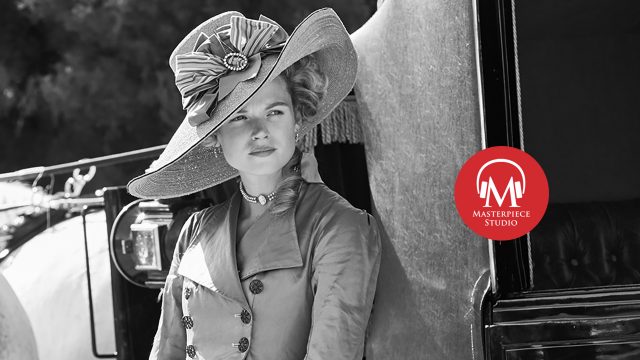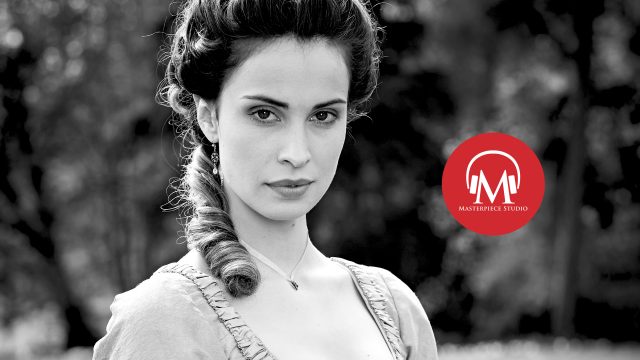Dr. Dwight Enys knows how to extract fish bones from throats, cure scurvy, and fix locked knees, but for all of his knowledge about the human body, he really struggles when it comes to matters of the heart. Actor Luke Norris joins us in the aftermath of the latest love drama to comment on whether or not things will ever come around for the good doctor.
Download and subscribe on: iTunes | Spotify| RadioPublic
Transcript
Jace Lacob (Jace): In the spirit of Dr. Dwight Enys, we’re lighting a symbolic bonfire to warn you of the spoilers that lie ahead. If you have yet to see the sixth episode of Poldark, Season 2, you might want to save this episode for later.
MASTERPIECE Studio is brought to you by Audible. For a free trial, go to Audible.com/Masterpiece.
Jace: I’m Jace Lacob and you’re listening to MASTERPIECE Studio.
Despite working for pennies on the pound, Dwight Enys is perhaps THE most skilled physician in Cornwall. He knows how to extract fish bones from throats, cure scurvy, and fix locked knees.
But for all of his knowledge about the human body, Doctor Enys really struggles when it comes to matters of the heart.
In the first season of Poldark, Dwight’s affair with Keren led to her being murdered by her husband, Mark.
CLIP:
Dwight: The girl I fell in love with, Keren Daniel, she too was a patient of mine, and though her death is not on my hand, it is on my conscience.
Jace: And now in Season 2, Dwight’s relationship with heiress Caroline Penvenen is proving to be just as complicated.
CLIP:
Luke Norris: In terms of their social standing, they’re poles apart, but although it’s difficult, I think a lot of the best love stories are.
Jace: In the aftermath of Dwight and Caroline’s failed elopement, actor Luke Norris joins us to talk about the shocking sixth episode, and whether or not there’s any hope for our unlucky lovers.
Welcome.
Luke: Thank you very much for having me.
Jace: Were you familiar at all with Winston Graham’s Poldark novels or the original 1970s adaptation?
Luke: I wasn’t at all, no. I thought Poldark was a cop show or something. I’d never heard of the 70’s version, my parents didn’t watch it or anything like that, so it was all brand new to me.
I’ve since read the first four novels, which cover Series 1 and 2, and they’re great fun.
Jace: What did you make of the character of Dwight Enys when you first read the script?
Luke: I got straight into the politics of it, really. I was quite keen on making sure that he represented the NHS’s as Winston Graham saw it, healthcare for anyone in need. And I think, there’s something about his benevolence, and that there is a giving nature that I wanted to try to tap into. But he’s obviously also quite flawed, and is led astray by his heart a lot, and that’s fun to play too.
Jace: What have you made of his journey so far?
Luke: When Dwight Enys turns up in Cornwall, I think, he’s quite fresh faced and quite innocent to a degree. But that quickly goes sour with his involvement with Keren Daniel, which, kind of, makes him grow up, I think, quite a lot, quite quickly.
CLIP:
Dwight: This must stop, Keren, this coming here. Your husband does not like it.
Keren: Do you like it?
Dwight: I have work to do.
Luke: That’s where you find him in the start of Series 2, and into the relationship with Caroline.
Jace: I mean, what strikes me about Dwight is his sense of decency and honor. Is he — and I mean this without it sounding loaded — a “good guy?”
Luke: Yeah, I guess he is. Yeah. I mean, there’s a sort of ambivalence about Ross Poldark, and about how we’re supposed to feel about him at times. I think, Dwight is trying to hold a moral high ground in that there’s fortitude and dependability of a best friend is his role in the books and again in the series.
Jace: He’s a doctor, but he’s not an aristocrat. Where does Dwight Enys fit into the highly stratified society of 18th century Cornwall?
Luke: I suppose he’s a sort of brand new middle class. He is from “good stock” as he says to Ray Penvenen when he’s trying to win Caroline.
CLIP:
Ray: As for a serious attachment with a young man of your station…
Dwight: I am a gentleman, Sir.
Ray: And she is an heiress.
Luke: But the novels let us know that they’ve no money, basically, and everything was spent on his education, and he comes back to Cornwall with nothing really.
CLIP:
Caroline: How do you live?
Dwight: On an income of 40 pounds a year from the two mines, plus whatever my patients can spare me. I agree, it’s very little.
Luke: And so he’s, sort of, a bit like Ross himself, is in this hinterland between the working class and the aristocracy. He’s a skilled worker with no money.
Jace: And does that struggle then inform his own personal politics?
Luke: Yeah, I think so, yeah. The politics at the time are very volatile anyway, and particularly when it comes to the class structure, as you mentioned. The rights and privileges afforded the upper classes don’t sit easily with him, as somebody who believes in the equality of human life and fairness.
Jace: Now Dwight and Ross met at war and it’s Dwight who patches up Ross’s face, which is a major change made by Debbie Horsfield in this version of Poldark.
Luke: Yeah.
Jace: What do you make of the two men’s friendship?
Luke: I think, it’s a brilliant change from Debbie because it gives us a short hand into the kind of brotherhood and camaraderie that they have and share going forward. I think, they are the yin to each other’s yang if you like. Ross has a lot of qualities Dwight lacks, and the same the other way around, I think.
Jace: In Season 1, Dwight falls into an illicit affair with married actress Keren, who is then crushed to death by her jealous husband, Mark. What tempts him with Keren and what does he learn from the experience?
Luke: Well, I think, there’s a — I mean, apart from the actress who played it, Sabrina Bartlett, being completely beautiful — there’s a freedom and an honesty to that way of life, the traveling player, that Dwight never had himself, I think, being quite fastidious about his studies. I think, there’s something about that.
Jace: Dwight first meets Caroline Penvenen when he’s summoned to tend to a sick patient, only to learn that the patient in question is actually Caroline’s pug.
CLIP:
Dwight: May I be of service?
Caroline: I hope so. My darling little Horace has had two fits and now he’s barely breathing. Will you attend on him, please?
Dwight: Your dog?
Jace: What does he initially make of this very privileged girl?
Luke: I think, his hackles are up straight away. He’s quite a serious individual, in some ways, and the idea of being called out to treat a pug is not what he needs, particularly at the time when his friend is on his way to being hanged, potentially.
She proves herself, I guess, over the course of the series that there’s more to her than this entitled privileged heiress.
Jace: You and Gabriella Wilde share such a great chemistry that sparks fly immediately when Dwight and Caroline meet, cementing this great love/hate relationship. What did Gabriella bring to that dynamic?
Luke: She is about as blue blooded as they come, I think, so we naturally have that class divide, social disconnect. And she, like Caroline, is wonderful and lovely, and there’s much, much more to her than a cut-glass accent. But I think that gave us a real short cut into that relationship.
Jace: Caroline seems to represent the very institution that Dwight rails against: wealth, excess, privilege. Is this a love between opposites, or of equals, or both?
Luke: Both, absolutely, yeah. In terms of their social standing, they’re poles apart, but fundamentally, I think, they each believe in the power of love above anything else. Although it’s difficult, I think a lot of the best love stories are.
Jace: There’s a gorgeous scene with Dwight and Caroline in the woods. She’s wearing this deep red dress and the two of them finally kiss after being reunited. Dwight says…
CLIP:
Dwight: Would you have me pretend to be other than I am?
Caroline: I would have you believe that you’re better than you think.
Jace: What was it like filming that particular scene?
Luke: It was really fun, but at that stage of shooting though, I should say that Gabriela was maybe 6 or 7 months pregnant (laughs), so there was a lot of shooting around the bump and kissing from a distance.
Jace: (Laughs) You could not tell.
Luke: Well good, I’m pleased.
Jace: In the same episode, Dwight is summoned by Ray Penvenen and he stands up to Caroline’s uncle. He says, “I’m a gentleman sir.” Before giving a gorgeous speech about how Ray is insulting both him and Caroline.
CLIP:
Dwight: God knows I’ve never given you cause to suppose me a fortune hunter. And if you imagine that no man without an eye to her inheritance can fall in love with you niece, then you greatly underrate her charms, and insult us both.
Jace: Do you feel that this is Dwight at his very best: forthright, honorable, steadfast?
Luke: Yeah, I guess so. Maybe a little more hot-headed than he would like to be at his best. But, like I said, I think the idea of an enduring love is really important, particularly after Keren Daniel. And the idea that Ray Penvenen is cheapening that, I think, provokes something in Dwight that is quite honorable, and really makes him cling to his belief.
Jace: He sums up his feelings for Caroline thusly…
CLIP:
Dwight: Without you, nothing is possible.
Jace: Why do you feel these two suit each other so well?
Luke: Why do they suit each other so well? I think, because Caroline is inherently mischievous, and Dwight has spent his life being quite sensible, and the idea that she can provide that kind of excitement for him, forever more, is what he’s into.
Jace: Caroline secretly pays off Ross’s debt to the Warleggans, freeing him and Demelza from their yoke. Is it Dwight’s influence that compels her to help? Has he changed her?
Luke: Absolutely I think, yeah. They’ve changed each other. That sense of social justice is something that, I think, takes Caroline by surprise. I don’t think, because she’s in her ivory tower, that she’s quite aware of the hardships that people are suffering until the talk of scurvy and everything, and the oranges, and that’s the beginning of the ball rolling to redistribute some of her wealth and privilege.
Jace: Your character goes so far as to cut off a corpse’s legs and sticks his hands inside the thing to help poor Rosina. What exactly was the corpse’s leg made out of?
Luke: It’s some sort of rubber polymer thing. It was a genius piece of work from the art department, and I don’t quite know how they managed to do it, but it felt like a leg, it weighed the same as a leg, it was really something and quite gross on the day.
Jace: It seemed kind of squishy and…
Luke: Yeah, yeah it was.
Jace: Are you squeamish at all in real life?
Luke: Not really, but there was a… It’s coming up, I think, in Episode 9 maybe… A pig’s heart makes its way into the show. And so we had one of those on a very small set one afternoon that had been in the heat for a while, and was not pleasant.
Jace: So that did gross you out.
Luke: That grossed everyone out a little bit, yeah. We were all running out of the set every time they called cut.
Jace: That sounds disgusting.
Luke: (Laughs) It really was.
Jace: I love the scene in that same episode between Dwight and Demelza in which he comes to say “goodbye” and acknowledges that in the Keren-Mark Daniel situation he quote, “Betrayed everyone and everything he holds dear.” What do you make of the rapport between Dwight and Demelza?
Luke: We have a running joke, Eleanor and I, that there’s some sort of secret romance happening there, because I spend an inordinate amount of time with her in private, given the time.
Jace: Behind closed doors, no less.
Luke: Behind closed doors, yeah (laughs). But that, I guess, is partly to illustrate the kind of trust between Ross and Dwight. But Demelza can hold her own anyway, we all know that.
Jace: After helping Rosina with her leg again, Dwight realizes that Charlie is the informer, and goes to confront him.
CLIP:
Dwight: Is there an ambush?
Charlie: I dunno.
Dwight: I think you do know.
Charlie: Well think what you like. You have no proof I’m a traitor.
Jace: Their fight is particularly vicious and ends with Charlie getting a knife in the gut. What is it like filming fight scenes for you?
Luke: That was absolutely exhausting. They needed two and a half minutes of fight, they told us, so Andreas, our fight coordinator took us through it the day before, but after four or five takes of it I was utterly exhausted.
Jace: And I read you had a not so great experience once with a stage fight. What happened?
Luke: Yeah. I was working for the Royal Shakespeare company about 6 years ago, 7 years ago maybe, and we were on tour doing a play that we had done 50 or 60 times. And the first thing that happens in the play is that I walk onto stage, and another actor walks on behind me, taps me on the shoulder, and punches me, or is supposed to seem to punch me in the mouth, but the other actor, George Rainsford, just, after having done it so many times, forgot that he was supposed to be missing and clocked me in the lip. So I have the scar to prove it; if you look closely on the next episode, you’ll see it.
Jace: And did you keep acting when he actually connected to you on stage?
Luke: Yeah (laughs). We were both in shock, I think. But it was a 90-minute play, straight through, with no interval. And my mouth was bleeding quite profusely, his hand was bleeding quite a lot, and we just thought we’d carry on, get through the play and then, sort of, talk about it afterwards. And he actually, George, ended up staying in the hospital for a week on a drip, because my tooth had cut a tendon in his hand (laughs) and he needed to be patched up.
Jace: That’s very methody, very methody.
Luke: Yeah. A bit too much, right?
Jace: (Laughs) Rather than race to Caroline as he promised Demelza he would, Dwight heads to Nampara to light the bonfire in order to warn the others about the ambush. Why does Dwight choose his duty to Ross over his chance at happiness with Caroline?
Luke: We know that the price you pay for smuggling is death, so it really is life and death for them in a way that, hopefully, he’ll be able to redeem things with Caroline.
Jace: Well I’m going to ask, is there going forward any chance at reconciliation between the two lovers, despite Caroline’s note indicating that it’s over between them?
Luke: There’s a chance, yeah. It becomes ever more complicated and Ross weighs in with a favor of his own to try and help things out.
Jace: Charlie is found dead on the beach at the end of the episode, a knife in his gut. Will this death also weigh on Dwight’s conscience?
Luke: I think… Well, possibly not so much. There’s still an ambiguity about the way Charlie died. There’s a suggestion that he maybe did it himself. But this comes back, I suppose, to the kind of Martial Law thing, maybe operating in Cornwall, and maybe there is a sort of justice to it?
Jace: You describe yourself as an Essex lad in an era where most of the British actors we come to know are public school types. How does that designation play into your work and your world view?
Luke: It’s a huge part of my worldview certainly, and not so different from the things we’ve been talking about, actually. I think, it’s important to recognize your privilege of which I have plenty now, but where I started was not the case.
We were poor growing up, and I think that makes you a different kind of person, you know; it makes you view the world in a very different way. I went to drama school, and I’ve poshed up a lot, and most people wouldn’t know that I’m from Essex now, I suppose, unless I told them.
But I think, there’s something about having had to work a bit harder than some to get to where I am that makes me maybe more grateful for it or… I mean, that’s not to disparage anyone who has had a lot of privilege, but I think it’s just useful to be aware of it.
Jace: Now, Aidan Turner’s bare-chested scything scene became synonymous with Poldark itself. Is it easier not to be in the glaring spotlight like that, as you said, “with your kit off?”
Luke: Yeah, I think so. It’s certainly easier for me. I’d be a bit embarrassed, for me, if I had to do that and I knew that my mum was going to be watching.
Jace: (Laughs) You’re friends with Game of Thrones actor Kit Harington. When asked about whether you’re envious of Kit’s fame you told the Telegraph, “I’m not an actor because I want that. I’d have to be in the gym more. I would have to look like Kit Harington when I take my shirt off.” Is that the price of fame?
Luke: No, I sort of said that flippantly at the time. I think, you know, people of all shapes and sizes become actors, and some of them become very successful and very famous, and some of them don’t, and I don’t think there’s any correlation between six packs and success.
Kit’s in airports and magazines all over the world. He was on the cover of Rolling Stone. That is pretty exciting, but also, if we go to a local pub for a pint, he can’t sit for more than five minutes without somebody wanting to come and take a photo, so I think that is more the price you pay.
Jace: Now that Season 2 of Poldark is airing in the UK, are you getting recognized in the street?
Luke: Yeah, a bit more. I mean, I live in London and in London people are pretty reserved about talking to you most of the time. In fact, nigh on rude. And actors are 10 a penny; you can’t throw a stone without hitting an actor in London, so I think people usually keep themselves to themselves.
Jace: You’re an actor and a writer. How does one inform the other?
Luke: Well, I think, the more scripts you read as an actor, the more you learn what works and doesn’t work as a writer, and visa versa really. I’d like to think I know what is a good line for an actor to say, because I’m sitting there writing it out, improvising with myself.
Jace: You began writing when you didn’t initially get into drama school. Was it a fall back position of sorts, and in a larger sense, which gives you greater joy now: acting or writing?
Luke: I don’t know if it was a fall back so much as another avenue into working in the theater industry. I knew that that was where I wanted to be. I wanted to be in the theater, and I wanted to be around those people. I started writing just in case I didn’t get into drama school, and I thought maybe I could put myself into something I’d written, but the first few things I wrote were terrible and I decided that, actually, I’d rather write for other people and make it less ego-centric.
And now, I really love being an actor for a living because you get to hang out with wonderful people, and as a writer you spend most of your time alone (laughs), but the end product is enormously gratifying when you get to offer other people work. And when you get to go and sit in a dark room with a bunch of strangers, and see things that you’ve written come to life, it’s really exciting.
Jace: You wrote, “Goodbye to All That,” when you were just 26 years old. What was the experience of early success like?
Luke: Well, “Goodbye to All That,” was on at the Royal Court in Sloane Square in London, which was a theater that I was first taken to by my drama teacher at school, and knew to be the premier new writing theater in London, so I sort of thought all my Christmases had come at once.
I remember getting the phone call, to say that they were going to program my play, and I just cried my eyes out in a way that I never had actually with an acting job, but I was really overwhelmed.
Jace: Your most recent play was “Growth” about a man who discovers that he has a lump on his testicle. Was it challenging to write about cancer in a way that wasn’t all doom and gloom?
Luke: I never really thought about it as a play about cancer, to be honest. “Growth” is about a guy who’s resisting getting checked, and then resisting all the other changes that come after having been diagnosed.
For me, it’s as much a play about my unwillingness to complete a tax return, or anything else, as it is about cancer. It’s about growing up really, which is why it’s called, “Growth.” It’s about confronting your problems and doing something about them, and how, as an adult, you don’t really have a choice but to do those things.
Jace: What inspires you as a writer and as an actor? Is it the same thing?
Luke: Yeah, I suppose, in a lot of ways, like a lot of actors, I’m a bit of a social voyeur. I see– I find myself picking up tidbits from a lot of different people, for characters for plays, and for characters to portray. I guess a fascination with people, and what makes them tick is the root of both things.
Jace: Do you have a favorite scene from the first two seasons of Poldark, so far?
Luke: Oh, do I have a favorite scene? Yeah, there was a really brilliant day… Is it that? I don’t know, this is tough. This is really tough. I’ve got so many.
Maybe, my first day on set in Cornwall last year was the first time I’d ever ridden a horse on screen. It was my first time as a regular on a show. To get to do all of those things on a Cornish cliff top, in the brilliant sunshine, on day one of filming was pretty special.
Jace: That sounds amazing.
Luke: Yeah, it really was.
Jace: Luke Norris. Thank you so much.
Luke: Thank you, it has been a pleasure.
Jace: Though there are only 3 episodes left in Season 2, rest assured that there are plenty of surprises still to come. Catch the next episode of Poldark, Sunday, November 13th on MASTERPIECE.
Be sure to subscribe to MASTERPIECE Studio on iTunes or Stitcher so that you get automatic downloads of new episodes whenever they’re released.
MASTERPIECE Studio is hosted by me, Jace Lacob and produced by Rachel Aronoff. Kathy Tu is our editor. Special thanks to Barrett Brountas and Nathan Tobey. The executive producer of MASTERPIECE is Rebecca Eaton.
MASTERPIECE Studio is brought to you by Audible.
Sponsors for MASTERPIECE on PBS are Viking River Cruises, Audible, and The MASTERPIECE Trust.
Poldark Podcasts 68 More Podcasts
MASTERPIECE Newsletter
Sign up to get the latest news on your favorite dramas and mysteries, as well as exclusive content, video, sweepstakes and more.












